17 Sep 2014 | Azerbaijan, Azerbaijan News
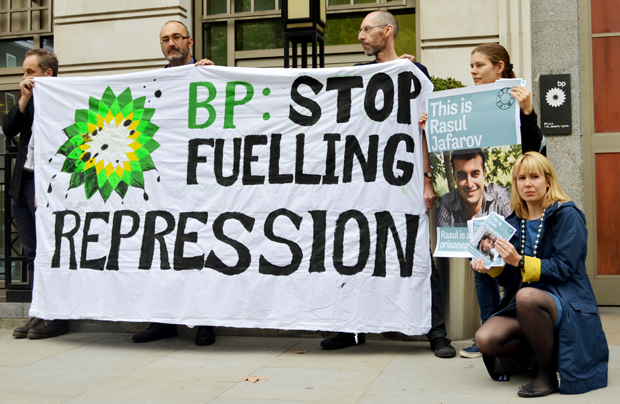
Protest outside BP HQ in London (Photo: Dave Coscia)
Protesters called on global oil giant BP to reassess its connections with the regime in Azerbaijan at a gathering outside the company’s London headquarters.
This week marks the anniversary of the signing of the Contract of the Century, when BP began its 20 year relationship with the Aliyev family. The protesters argue that BP’s role in Azerbaijan has provided the former president, Heydar Aliyev, and the current president, his son Ilham, with considerable power and money, facilitating the country’s repressive regime and hampering democracy.
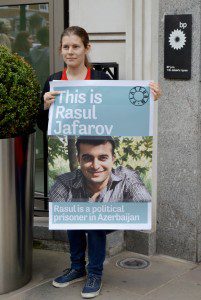
Claire James – Campaign against Climate Change (Photo: Dave Coscia)
There are currently 98 political prisoners being held in Azerbaijan and the threat of arrest others is also high. Recently, prominent activists Leyla and Arif Yunus and Rasul Jafarov have been jailed, as well as human rights lawyer Intigam Aliyev.
Ramute Remezaite, a human rights lawyer who worked in Azerbaijan, told Index on Censorship: “It’s very important to tell BP that it is totally intolerable to cooperate with the government of Azerbaijan, it’s repressing its own people and putting them to prison for reasons such as exercising their fundamental human rights.
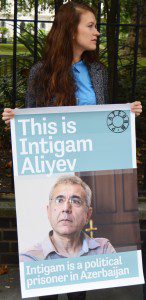
Ramute Remezaite – Human rights lawyer (Photo: Dave Coscia)
“Another reason why it’s very important to be here and to hold this action, is as solidarity with our colleagues in Baku because such an action is impossible these days in Azerbaijan — people standing in front of the BP office in Baku would be immediately arrested and sentenced to one, two, three weeks in prison.”
A group of Azerbaijani civil society organisations plan to send a letter to Bob Dudley, group chief executive of BP, demanding that the company call on the Aliyev government to release all political prisoners, and ensure that other prominent human rights defenders, such as Emin Huseynov, will not face arrest.
Emma Hughes from Platform London, who organised today’s protest, told Index: “We’re here today in solidarity with Azerbaijani civil society who are calling on BP to raise the case of the 98 political prisoners in Azerbaijan and also to drop their sponsorship of the 2015 Baku European Olympic Games.”
Also attending the protest, alongside Platform London and Index on Censorship, were representatives from Campaign Against Climate Change, Article 19 and BP or not BP.
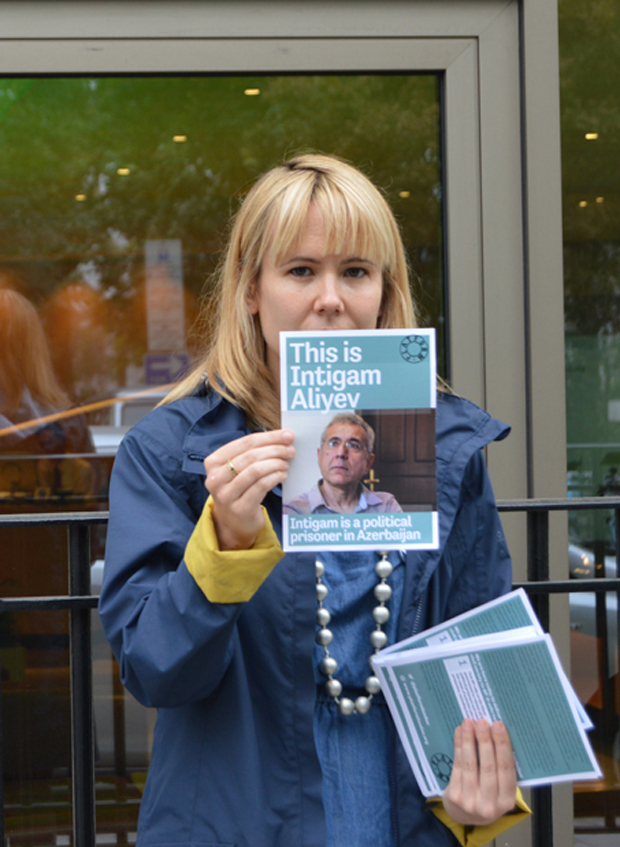
Emma Hughes – Platform London (Photo: Dave Coscia)
Claire James, from Campaign Against Climate Change, told Index: “I’m here partly in solidarity with political prisoners but also because our world’s addiction to fossil fuels is overcoming any common sense about what we’re doing to the planet and it should not also be overcoming human rights.”
In conclusion to the letter, Azerbaijani civil society asks that BP ceases its activities in the country until such times as a “democratic and accountable government is in power”.
This article was posted on 17 Sept 2014 at indexoncensorship.org
16 Sep 2014 | Magazine, Volume 43.03 Autumn 2014
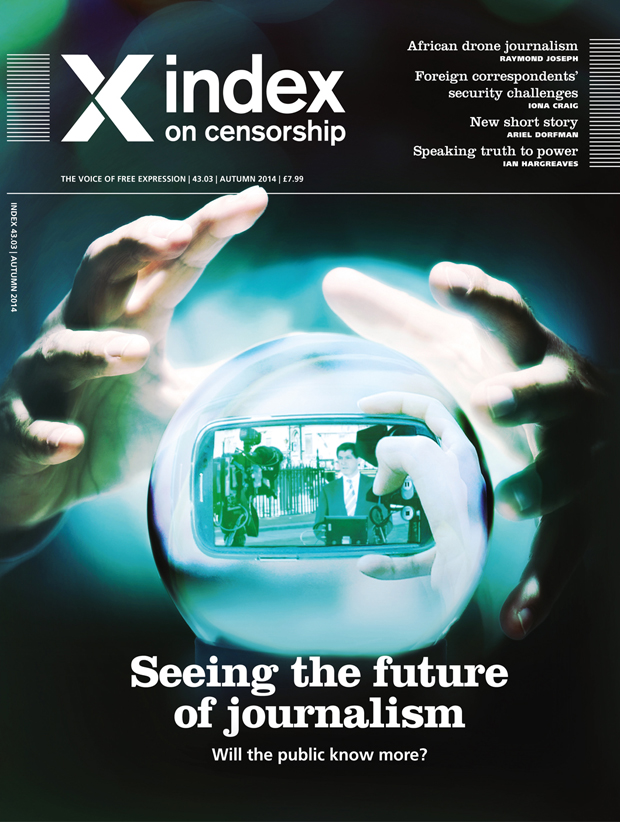
Index on Censorship autumn magazine
In the autumn issue of Index on Censorship magazine, don’t miss: Burmese-born author Wendy Law-Yone on the challenges the Burma’s media face in the run-up to the next election; TV journalist Samira Ahmed on how television channels should respond to viewers’ complaints; award-winning foreign correspondent Iona Craig reports from Yemen on threats to journalism in conflict zones; plus a brand new short story from playwright and author Ariel Dorfman.
While debates on the future of the media tend to focus solely on new technology and downward financial pressures, we ask: will the public end up knowing more or less? Will citizen journalists bring us in-depth investigations? Will crowd fact-checking take over from journalists doing research? Who will hold power to account? The subject is tackled from all angles, from our writers from across the globe.
Also writing for this issue are Australia’s race commissioner Tim Soutphommasane; human rights lawyer Tamsin Allen on defamation; and novelist Kaya Genc. From South Korea Steven Borowiec talks to controversial artist Lee Ha, and in London political editor Ian Dunt walks the corridors of political power in the UK’s Houses of Parliament and asks if journalists there get too close to government.
Other articles include:
- African digital journalism by Ray Joseph
- Generation why by Ian Hargreaves
- Funding news freedom by Glenda Nevill
You can buy the print version magazine or subscribe for £31 per year here, or download a digital version for your iPad for just £1.79. All subscriptions help fund Index’s work, protecting freedom of expression worldwide.
Read about our magazine launch at the Frontline Club on 22 October.
FULL CONTENTS: ISSUE 43, 3 – The future of journalism
Back to the future: Iona Craig on journalists trying to stay safe in war zones
Digital detectives: Ray Joseph on the new technology helping Africa’s journalists investigate
Re-writing the future: Five young journalists talk on their hopes and fears for the profession – from Yemen, India, South Africa, Germany and the Czech Republic
Attack on ambition: Dina Meza on a Honduran generation ground down by fear
Stripsearch cartoon: Martin Rowson envisages an investigative reporter meeting Deep Throat
Generation why: Ian Hargreaves asks on how the powerful may or may not be held to account in the future
Making waves: Helen Womack reports from Russia on the radio station standing up for free media
Switched on and off: US journalist Debora Halpern Wenger on TV’s power shift from news producers to news consumers
TV news will reinvent itself (again): Taylor Walker interviews a veteran TV reporter on the changes ahead
Right to reply: Samira Ahmed on how the BBC tackles viewers’ criticism
Readers as editors: Stephen Pritchard on how news ombundsmen create transparency
Lobby matters: Political reporter Ian Dunt on the push/pull of journalists and politicians inside Britain’s corridors of power
Funding news freedom: Glenda Nevill looks at innovative ways to pay for reporting
Print running: Will Gore on how newspapers innovate for new audiences
Paper chase: Luis Carlos Díaz on overcoming Venezuela’s newsprint shortage
IN FOCUS
Free thinking? Australia’s race commissioner Tim Soutphommasane on bigotry
Guarding the guards: Jemimiah Steinfeld on China’s human rights lawyers becoming targets
Taking down the critics: Irene Caselli investigates allegations that Ecuador’s government is silencing social media users
Maid equal in Brazil: Claire Rigby on the Twitter feed giving voice to abuse of domestic workers in Brazil
Home truths in the Gulf: Georgia Lewis on how UAE maids fear speaking out on maltreatment
Text messaging: Indian school books are getting “Hinduised”, reports Siddarth Narrain from India
We have to fight for what we want: our editor, Rachael Jolley, interviews the OSCE’s Dunja Mijatovic on 20 years championing free speech
Decoding defamation: Lesley Phippen’s need-to-know guide for journalists
A hard act to follow: Tamsin Allen gives a lawyer’s take on Britain’s libel reforms
Walls divide: Jemimah Steinfeld speaks to Chinese author Xiaolu Guo about a life of censorship
Taking a pop: Steven Borowiec profiles controversial South Korean artist Lee Ha
Mapping media threats: Melody Patry and Milana Knezevic look at rising attacks on journalists in the Balkans
Holed up in Harare: Index’s contributing editor Natasha Joseph reports from southern Africa on the dangers of reporting in Zimbabwe
Burma’s “new” media face threats and attack: Burma-born author Wendy Law-Yone looks at news in the run up to the impending elections
Head to head: Sascha Feuchert and Charlotte Knobloch debate whether Mein Kampf should be published
CULTURE
Political framing: Kaya Genç interviews radical Turkish artist, Kutlug Ataman
Action drama: Julia Farrington on Belarus Free Theatre and the upcoming Belarus election
Casting away: Ariel Dorfman, a new short story by the acclaimed human rights writer
ALSO
Index around the world: Alice Kirkland gives a news update on Index’s global projects
From the factory floor: Vicky Baker on listening to the world’s garment workers via new technology
16 Sep 2014 | Europe and Central Asia, Mapping Media Freedom, Netherlands, News and features
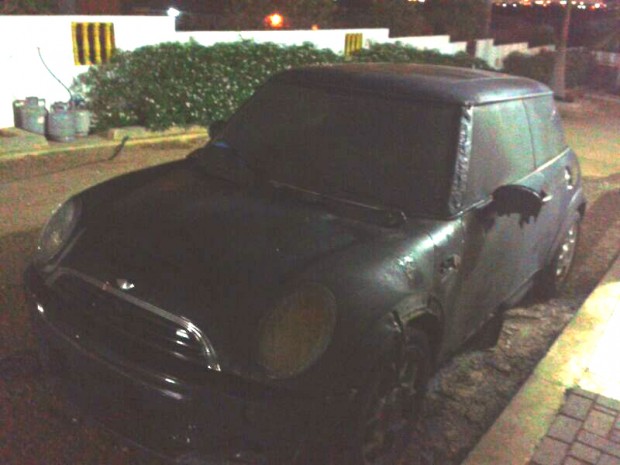
Journalist Richeron Balentien woke up one night to find his car had been torched (Photo: Richeron Balentien)
It’s a Wednesday morning in May 2014, around 3am and still dark outside. Radio journalist Richeron Balentien, his girlfriend and their 2-year-old daughter are sound asleep until the smell of fire wakes them up. When they look out of the window they see Balentien’s car burning in the yard in front of the house. He immediately knows what is going on.
“It was a clear threat,” Balentien told Index on Censorship over the phone. “It was a warning, to shut me up.” The police confirmed the car was purposely set alight. The perpetrator has not been brought to justice.
The Netherlands is always found near the top of press freedom rankings, this year second only to Finland in the Reporters Without Border’s Press Freedom Index. But rarely taken into account, however, are the Dutch islands in the Caribbean sea. The largest of these, Curacao, became a constituent country of the Kingdom of the Netherlands in 2010.
If Curacao was included in the Netherlands’ press freedom score, it might not place so high on the list. Journalists like Balentien face threats and attacks, as they fight a lonely and dangerous battle to get the truth about corruption and organised crime on the island out.
The attack on Balentien’s car happened just a few hours after Gerrit Schotte, the first prime minister of an autonomous Curacao, was arrested on allegations of money laundering and forgery during his time on power. He was released after a week in custody, but the investigation is ongoing.
Balentien aired the news on his radio station Radio Direct, while many other media outlets kept silent. “This is a small island,” he said. “Everybody knows each other. Most journalists don’t investigate. They don’t want to get into trouble”.
According to a recently published Unesco report, Curacao’s media are “not able to fulfil their role as watchdog of authorities and other powerful stakeholders in society”. It also highlights issues around journalist safety, stating that “some recent cases of harassment of journalists have caused public debate on the issue of safety and are reason for concern”.
The report concludes that social and political pressures lead to self censorship among the press, as “dependency on good relationships with sources of information on one hand and protection of relatives on the other hand is very much a threat”.
In May 2013 the island was shocked by a political murder. Helmin Wiels, a popular politician determined to rid the island of high level corruption, was shot dead by an assassin in broad daylight.
The atmosphere on the island has been tense ever since, Balentien said. “Nobody thought it was possible that someone of that calibre could get killed. It shocked the entire island,” he explained. “The atmosphere changed. Everyone is afraid.”
Two men were sentenced to life in prison for killing Wiels, but it’s still unclear who gave the orders. Many believe they came from high up. There has been speculation that former Prime Minister Schotte knew about the plan, said Balentien — something Schotte himself denies. Wiels had accused the state telecommunications company of involvement in illegal sales of lottery tickets.
The Wiels case is one of Balentien’s ongoing investigations. “I feel everything is being done to keep the truth about this murder behind closed doors,” he said. “We need to know who gave the orders.”
A 2013 Transparency International study shows “a general lack of trust in key institutions” in Curacao. The anti-corruption watchdog labels this “a major obstacle” which will “limit the success of any programme addressing corruption and promoting good governance”. As for the media, the report highlights the lack of trained journalists, with content open to influence by the private financiers and advertisers on which “many media companies are heavily dependent”. Few requirements to ensure the integrity of media employees also “undermines the independence and accountability of the media,” according to the group.
Balentien is sure that former prime minister Schotte gave the order to attack his car. “Sources told me that it was discussed within the party to set my car alight to frighten me,” he said. “I have never been afraid to talk about Schotte, his party or the corruption.”
Dick Drayer, the Curacao correspondent for the Dutch national broadcaster NOS, also believes there was a political motive behind the attack. “Schotte’s party is behind this, everybody knows that,” he told Index on Censorship.
Drayer has been working as a journalist on the island for nearly ten years. “I see is an increase of intimidation towards journalists. Journalists here are taught not to ask questions. There is verbal and physical violence. When you dig in dirty business in Curacao, you know you can get into trouble. That leads to self censorship,” he said. “In Netherlands the media controls the power, in Curacao it’s the other way around.”
While the island has had its own government since 2010, ties with the Netherlands are still strong. Corruption and organised crime in Curacao are occasionally discussed in Dutch parliament and the Dutch police is involved in the Wiels murder investigation.
But “the relationship is disturbed,” according to Dryer. “The Netherlands is careful to intervene when things are going the wrong way on the islands, because they’re afraid to be seen as the coloniser.” He thinks his country could be more involved when it comes to corruption and organised crime. “They should speak up more. The Netherlands worries about human rights in China, but when it comes to Curacao they say it’s an internal matter.”
After the car incident, Balentien’s station Radio Direct continued to receive anonymous phone threats. “I am aware,” he said. “I look around. I turn to see who’s driving behind me. I check my house before I enter.”
Despite this, he maintains he will keep up his investigative reporting on high level corruption and the Wiels murder case.”Because I don’t want this island to be ruined by these people anymore”.
More reports from The Netherlands via mediafreedom.ushahidi.com
Bloemendaal municipality accused of censoring local newspaper
Journalists attacked during anti-ISIS protest in The Hague
Journalist on trial for defamation
Photographer assaulted by housing corporation employee
Restrictions on filming inside parliament building
This article was posted on 16 Sept 2014 at indexoncensorship.org
15 Sep 2014 | Germany, Mapping Media Freedom, News and features, Politics and Society
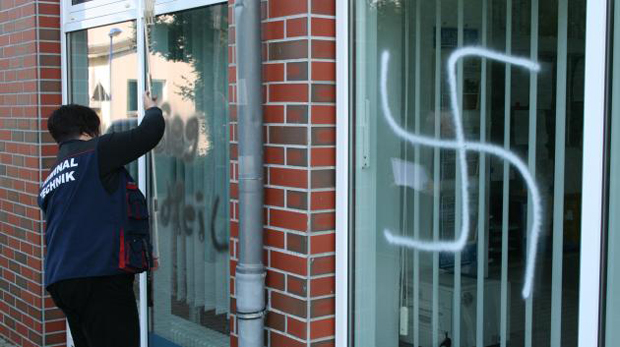
Vandals attacked the Lausitzer Rundschaufor the second time in a week.
On the night of September 4-5, the daily newspaper Lausitzer Rundschau became victim to a crime by now familiar to its employees: neo-nazis vandalised the outside of one of its office buildings in the eastern German city of Spremberg, covering it with anti-Semitic graffiti. Less than a week later, on the night of September 8-9, another Lausitzer Rundschau office in the nearby city of Lübbenau faced a similar attack.
The incidents were covered by national and local media in Brandenburg, the state surrounding Berlin. Right-wing extremism has been a sensitive topic for the Lausitzer Rundschau—only two years ago, the newspaper’s Spremberg office was also vandalized by neo-Nazis who left graffiti and an animal carcass outside the building. Shortly before the 2012 attack, the newspaper had reported critically about a right-wing extremist march in Spremberg.
Klaus Minhardt, president of the German Journalists’ Association’s local Berlin-Brandenburg chapter, sees offences like the ones against Lausitzer Rundschau as motivated by a small group of individuals lashing out against specific media reports.
“People like to make journalists their victims and to take revenge out on them. Usually, somebody does something bad and the journalist who uncovers that becomes the face of the issue,” Minhardt said.
A few days before the September 4 attack, Lausitzer Rundschau ran a report on a trial in the nearby city of Cottbus, where police testified that right-wing extremist paraphernalia was found on an alleged assailant’s body. Johannes M. Fischer, editor in chief of Lausitzer Rundschau, says the newspaper’s reporting on the trial is one reason for the recent vandalism. Another, says Fischer, is the upcoming Brandenburg state elections on September 14. Election posters in the area surrounding Lausitzer Rundschau’s offices were also covered in anti-Semitic graffiti after both of the new incidents.
This past week’s attacks on the newspaper were shocking because they were repeated in quick succession. According to Fischer, the kind of vandalisation was also more brutal than the previous incident in 2012.
“The quality is different. It has a horrible quality. The sayings are more violent. ‘Jews, Jews out, gas Jews,’ which was abbreviated as VE.G.,” Fischer said.
Because of the proximity between the two offices in Lübbenau and Spremberg, police have said that the same people are likely responsible for both of the September attacks on Lausitzer Rundschau. Fischer is also convinced that a only a few dozen people are behind the vandalisation, and he stresses that the Lausitz region is tolerant, while locals have expressed support for the newspaper after the attacks.
Lausitzer Rundschau has become well known for its aggressive reporting on neo-nazi activity in the region, which covers parts of the eastern German states of Brandenburg and Saxony. In 2013, two of the newspaper’s reporters won national prizes for their work on right-wing extremists in the area.
The “tough staff,” Fischer says, is not intimidated by the attacks on their offices and is determined to continue covering neo-nazi groups there. Fischer still refers to the vandalisation as a threat, and says he has offered reporters various options if they feel uncomfortable working after the attacks.
“They could switch to a different beat. And we also said, ‘You don’t have to write about this topic,’” Fischer said.
None of the Lausitzer Rundschau journalists took Fischer up on that offer. He adds, “They say, ‘Now we really have to do this.’”
More reports from Germany via mediafreedom.ushahidi.com:
Deutsche Welle accused of censorship
Public broadcaster fires blogger
Photographer arrested at protest
ECHR rules court decision to stop publication about Chancellor Schröder was illegal
Head of state chancellery intimidates journalists with legal warning
This article was published on Monday Sept 15, 2014 at indexoncensorship.org







